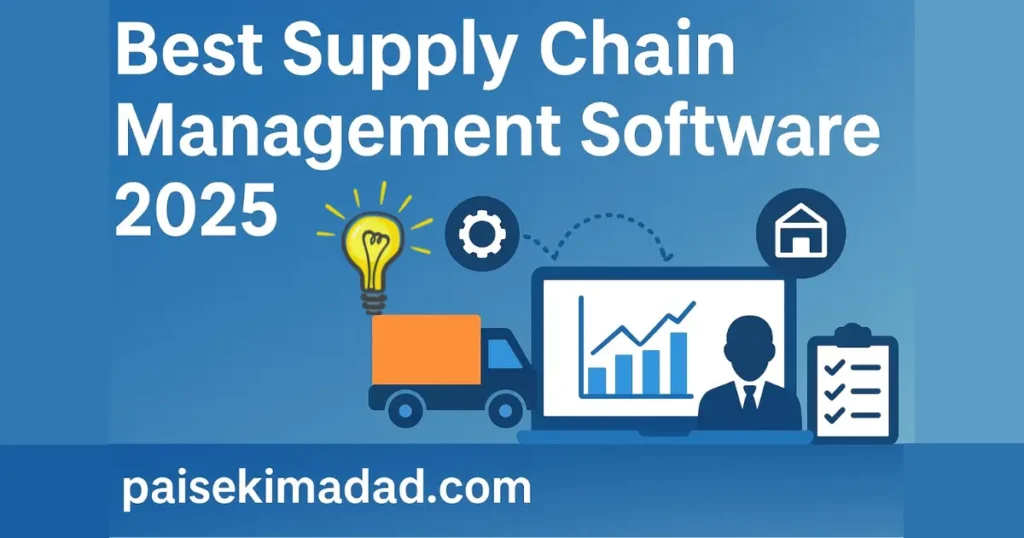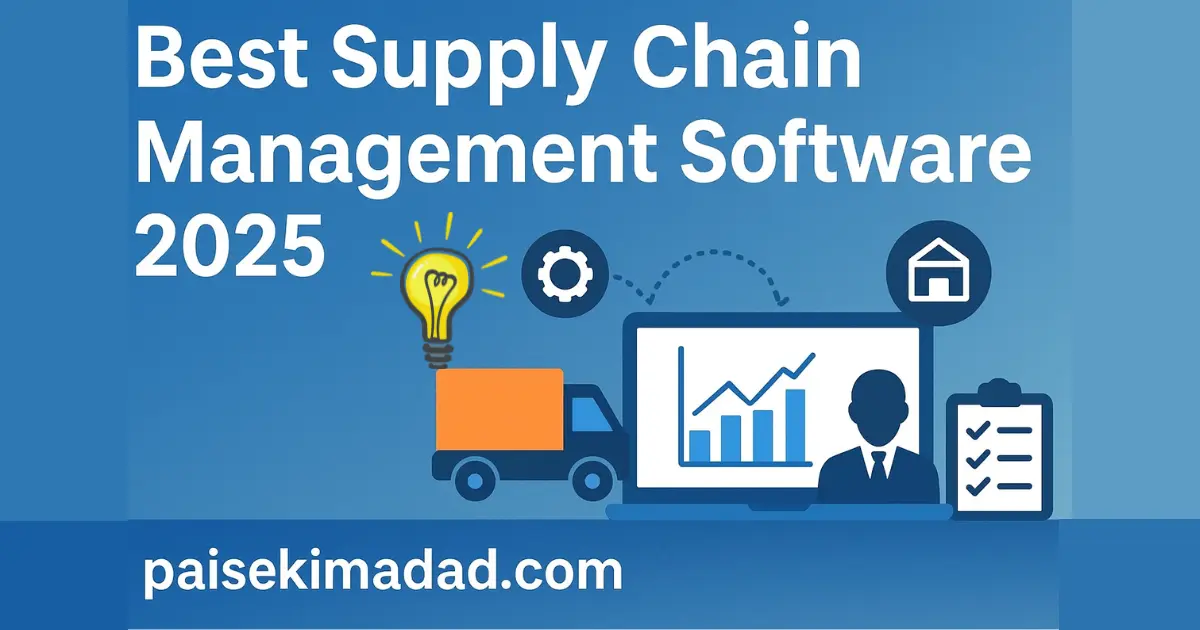Discover how supply chain management software can transform your business by optimizing logistics, reducing costs, and boosting efficiency.
Learn about key features, benefits, and how to choose the best software for your needs.
In today’s interconnected global economy, the efficiency of a business often hinges on the strength of its supply chain. From sourcing raw materials to delivering the final product, every step is crucial. This is where supply chain management software steps in, transforming complex logistical challenges into streamlined, optimized processes.

For businesses aiming for sustained growth and profitability, understanding and implementing effective supply chain management software is no longer an option, but a necessity.
The Evolving Landscape of Supply Chains: Why Supply Chain Management Software is Essential
The modern supply chain is a dynamic entity, constantly influenced by factors like fluctuating market demands, geopolitical shifts, and technological advancements. Manual tracking and fragmented systems simply cannot keep pace. Businesses need real-time visibility, predictive analytics, and the ability to adapt swiftly.
Supply chain management software provides precisely this, offering a centralized platform to manage, monitor, and optimize every facet of the supply chain. This leads to reduced operational costs, improved delivery times, and ultimately, enhanced customer satisfaction.
One of the primary benefits of investing in robust supply chain management software is the unparalleled visibility it offers. Imagine having a complete overview of your inventory levels across multiple warehouses, tracking shipments in real-time, and anticipating potential delays before they impact your operations.
This level of insight empowers businesses to make informed decisions, mitigate risks, and ensure a smooth flow of goods.
Key Features of Effective Supply Chain Management Software
What makes a particular supply chain management software stand out? While features can vary, a truly effective solution will typically include:
- Inventory Management: This core component allows for precise tracking of stock levels, demand forecasting, and automated reorder points, preventing both shortages and overstocking. Efficient inventory management software integrated within a broader SCM suite is invaluable.
- Warehouse Management Systems (WMS): Optimizing warehouse operations, from receiving and putaway to picking and shipping, is critical. A WMS module within supply chain management software ensures maximum efficiency in your storage facilities.
- Transportation Management Systems (TMS): Planning, executing, and optimizing the physical movement of goods is a complex task. A TMS helps with route optimization, carrier selection, and freight cost management, significantly reducing logistics expenses.
- Supplier Relationship Management (SRM): Building strong relationships with suppliers is vital. SRM features within supply chain management software facilitate better communication, performance tracking, and contract management.
- Demand Planning and Forecasting: Accurately predicting future demand is a cornerstone of efficient supply chain operations. Advanced analytics within the software can leverage historical data and market trends to provide robust forecasts.
- Order Management: From order entry to fulfillment, this feature ensures that customer orders are processed efficiently and accurately, improving the overall customer experience.
Driving Efficiency: The Impact of Supply Chain Optimization Software
The true power of supply chain management software lies in its ability to drive efficiency and optimize processes across the entire network. By automating routine tasks, minimizing human error, and providing actionable insights, it frees up valuable resources that can be redirected to strategic initiatives.
Businesses that embrace supply chain optimization software often see a significant reduction in lead times, improved on-time delivery rates, and a healthier bottom line. This optimization isn’t just about cutting costs; it’s about building a resilient and agile supply chain that can withstand disruptions and capitalize on opportunities.
Consider a manufacturing company that implements new supply chain management software. They can now track components from multiple international suppliers with ease, identify potential delays at any point, and adjust production schedules proactively.
This proactive approach minimizes downtime, prevents production bottlenecks, and ensures that products reach the market faster.
Selecting the Right Supply Chain Logistics Software
Choosing the ideal supply chain logistics software for your business requires careful consideration. It’s not a one-size-fits-all solution. Factors such as the size of your operation, industry-specific needs, existing IT infrastructure, and budget all play a role.
It’s important to assess solutions that offer scalability, robust integration capabilities with other enterprise systems (like ERP), and strong vendor support. Investing in the right supply chain management software is a strategic decision that can yield substantial long-term benefits.
Many businesses start by identifying their most pressing pain points within their current supply chain. Is it inventory control? Transportation costs? Supplier communication? This analysis can guide the selection process, ensuring that the chosen software directly addresses these critical areas.
The Future of Supply Chains: Integrated Solutions and AI
The future of supply chain management software is undoubtedly headed towards even greater integration and intelligence. We are seeing a growing trend towards cloud-based solutions, offering greater flexibility and accessibility.
Furthermore, the incorporation of artificial intelligence (AI) and machine learning (ML) is transforming capabilities, enabling more accurate demand forecasting, predictive maintenance for equipment, and highly optimized route planning.
These advanced features are making supply chain management software even more powerful and indispensable for businesses striving for a competitive edge.
Imagine an AI-powered supply chain management software that can automatically reroute shipments to avoid unexpected traffic jams, or one that can predict potential quality issues with raw materials based on historical data.
These advancements are not distant dreams but are becoming realities, further solidifying the role of sophisticated software in shaping the future of global commerce.
In conclusion, for any business operating in today’s complex commercial landscape, implementing effective supply chain management software is paramount. It’s the cornerstone of efficiency, resilience, and sustainable growth.
By leveraging the power of integrated systems and intelligent analytics, businesses can transform their supply chains from a potential bottleneck into a powerful strategic asset.
FAQs about Supply Chain Management Software
1. What exactly is supply chain management software?
Supply chain management software is a broad term for applications that help businesses manage the entire lifecycle of a product, from procurement of raw materials to manufacturing, inventory, logistics, and delivery to the end customer. It aims to optimize processes, improve efficiency, and enhance visibility across the entire supply chain.
2. How does supply chain management software benefit a business?
The benefits are numerous. It helps reduce operational costs by optimizing inventory and transportation, improves efficiency through automation, enhances customer satisfaction with faster and more reliable deliveries, provides real-time visibility into operations, and mitigates risks by enabling proactive problem-solving. It’s a key tool for effective supply chain optimization.
3. What are the core components of good supply chain management software?
Key components often include inventory management, warehouse management systems (WMS), transportation management systems (TMS), supplier relationship management (SRM), demand planning and forecasting, and order management. These modules work together to provide a comprehensive solution for managing the entire supply chain.
4. Can supply chain management software be integrated with other business systems?
Yes, most modern supply chain management software solutions are designed to integrate seamlessly with other enterprise systems, such as Enterprise Resource Planning (ERP) software, Customer Relationship Management (CRM) tools, and accounting software. This integration ensures data consistency and a holistic view of business operations.5. Is supply chain management software suitable for small businesses or just large enterprises?
While large enterprises have long adopted it, there are increasingly scalable and cost-effective supply chain management software solutions available for small and medium-sized businesses (SMBs). Cloud-based options, in particular, have made sophisticated SCM tools accessible to a wider range of businesses looking to improve their logistics and operations.
Disclaimer: This article is for educational and informational purposes only.
